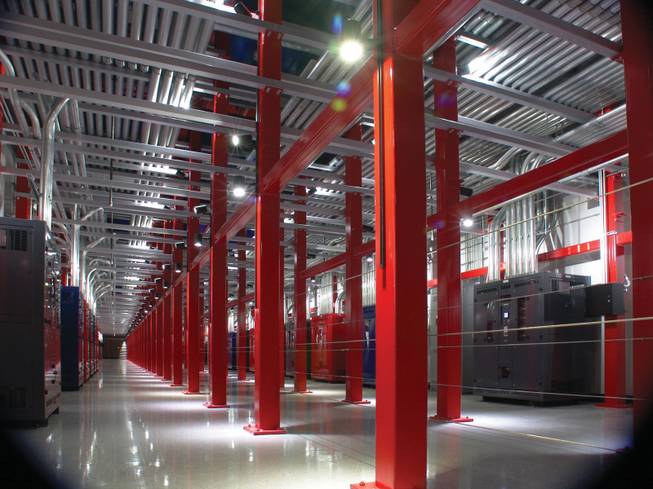
Switch
Switch, a high-tech company that started in Las Vegas, houses digital data for a number of Fortune 500 companies and the U.S. government in its expansive facilities.
Published Wednesday, June 10, 2015 | 11:37 a.m.
Updated Wednesday, June 10, 2015 | 3:56 p.m.
Related Stories
In a decision that could impact some of the state’s most influential businesses, the Public Utilities Commission of Nevada denied an application for a Las Vegas tech company to purchase and create power without NV Energy.
The three-member commission denied the application on a 2-1 vote.
Commission Chairwoman Alaina Burtenshaw and Commissioner David Noble voted down the application, citing concerns about potential rate hikes for remaining NV Energy customers if Switch left.
Switch, a massive data center with customers such as eBay and Sony, is one the utility’s largest customers.
Commissioner Rebecca Wagner was the dissenting vote.
She suggested the commission conduct a new investigation into how much Switch should pay to leave NV Energy.
She also suggested the PUC was disregarding the law that allows companies to create and purchase power without the utility if they consume more than 1 megawatt of power, pay an exit fee and receive PUC approval.
Wagner said the order to deny the exit was “almost a circumvention of the statute.”
Despite the order, Switch does have a path to leaving the utility. The PUC ordered that Switch and the utility take part in an "investigatory workshop" to address the commission's remaining questions about how Switch’s exit could affect the utility’s remaining customers.
Switch and NV Energy declined to comment.
Wagner supported Switch’s departure as long as the company paid a $27 million exit fee. That figure was the product of the PUC’s regulatory operations staff.
The staff, which is independent of the commission, determined Switch’s exit would not harm NV Energy’s remaining customers if the tech company paid the fee.
All parties in the case calculated exit fees to determine an amount that would not cause rates to increase for other NV Energy customers. Switch proposed $18 million, while NV Energy proposed nearly $60 million.
They based their figures on three-year forecasts — a formula the PUC has historically used for exit cases and when the utility asks the commission to increase its rates.
But Burtenshaw and Noble questioned the accuracy of the three-year forecast.
“I don’t have enough information to make an informed decision that staff’s $27 million is reasonable,” Noble said. “The key is looking at the remaining customers and making sure there are no harms or benefits. I don’t think there is enough information to do that.”
Wagner dismissed the notion, saying the commission “is changing the rules midstream...I can’t support that.”
Now, a new investigation will address how exit fees should be calculated and a potential tariff on companies that leave NV Energy. It may even suggest changes to the 2001 law that allows companies to leave the utility, which was an effort to provide large-scale power consumers with more options for buying and creating power.
Lawmakers passed the law during the California energy crisis spurred by Enron, the defunct energy company that manipulated power markets in Western states to improperly control the price and availability of electricity.
The investigation will likely involve some of the state’s premier casino companies — Wynn Resorts, Las Vegas Sands and MGM Resorts International. They have also applied to leave NV Energy.
“I would hope that would be the direction the commission would go — to sit down and look at a global settlement for all this stuff,” Randolph Townsend, a gaming commissioner and former state legislator who wrote the law that allows companies to exit the utility.
Together, the departures could mean a 10 percent reduction in the power company’s demand and the loss of some of its most profitable customers.
NV Energy has invested hundreds of millions in infrastructure in the last 15 years, building generating capacity and procuring purchase agreements for more than 4,000 megawatts of power — the equivalent used by 7,000 Super Wal-Mart stores.
The argument against large-customer exits hinges on utility expenditures for building new power infrastructure.
Switch and the casinos argue that it’s unnecessary to build new power plants when demand is not growing and large-scale consumers are pushing to leave.
NV Energy, which uses ratepayer money to expand its generation capacity and can earn a 9.8 percent return on investments, plans to spend at least $2 billion on new infrastructure in the next two years, according to a report from Berkshire Hathaway, NV Energy’s parent company based in Omaha.
Matthew Maddox, president of Wynn Resorts, addressed the commission’s concerns about ratepayers by comparing earnings on the Las Vegas Strip to those of NV Energy.
The utility earned $713 million in net operating income last year, a 27 percent increase from 2013.
“Just to frame these numbers, Nevada Energy made more net income than the Las Vegas Strip last year,” he said. “You can’t have a 27 percent increase in operating profit with no break on ratepayers and then try to claim ratepayers will be harmed when your net operating income is more than the Las Vegas Strip.”
That money, he said, doesn’t stay in Nevada. “It goes to Omaha,” he said.

Join the Discussion:
Check this out for a full explanation of our conversion to the LiveFyre commenting system and instructions on how to sign up for an account.
Full comments policy